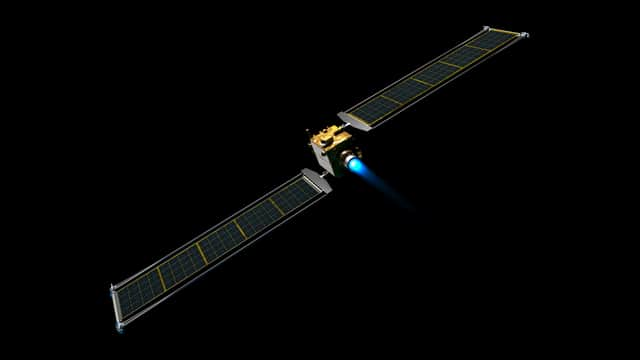Nasa launches spacecraft in first ever mission to smash into and deflect asteroid


Nasa has launched a mission that will see a spacecraft crash into an asteroid in a bid to smash it off course.
The double asteroid redirection test (Dart) will test defence technologies for preventing a hazardous asteroid impacting Earth, the first mission of its kind for the agency.
Here is everything you need to know about it.
How will the Dart mission work?
Advertisement
Hide AdAdvertisement
Hide AdThe aim of the mission is to prove that a spacecraft can autonomously navigate to a target asteroid and intentionally collide with it – called a kinetic impact – at roughly four miles per second (six kilometres per second).
Dart’s target is Dimorphos, an asteroid ‘moonlet’ which orbits a larger asteroid named Didymos.
Once launched, Dart will deploy roll out solar arrays (Rosa) to provide the solar power needed for its electric propulsion system, an evolutionary method of drive which should add significant flexibility to the mission timeline.
Dart will intercept Didymos’ moonlet in late September 2022, when the Didymos system is within 11 million kilometers (7 million miles) of Earth.
Advertisement
Hide AdAdvertisement
Hide AdThe collision will change the speed of the moonlet in its orbit around the main body by a fraction of 1%.
But this will change the orbital period of the moonlet by several minutes – enough to be observed and measured using ground-based telescopes and planetary radar on Earth.
Will the mission prevent Armageddon?
Neither Dimorphos nor Didymos are a threat to Earth.
But Nasa says the objects are a perfect testing ground should an Earth-threatening asteroid be discovered in the future.
While no known asteroid larger than 140 metres in size has a significant chance of hitting Earth for the next 100 years, only about 40% of those asteroids have been found as of October 2021.
How can I watch the launch?
Advertisement
Hide AdAdvertisement
Hide AdDart launched at 6.20am UK time on Wednesday 24 November on a SpaceX Falcon 9 rocket from Vandenberg Space Force Base in California, in the US.
Nasa provided coverage of the both the pre-launch activities and the launch itself.
Launch coverage on Nasa Television is also available through the Nasa app and the agency’s website.
A version of this article originally appeared on our sister title, NationalWorld